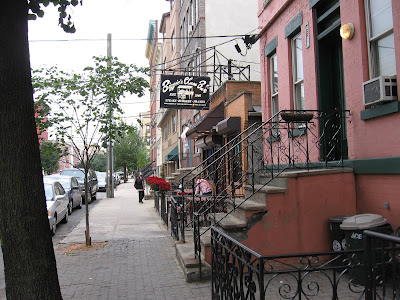January 1: I just love those montages of world events they put on tv at the end of every year, even the inevitable memorials to those well-known people we lost during the year. A year later, and I'm still talking about this. Guess I will always love those things.
February: Saturday afternoon the odd little bell-chime sounded telling me I had a text message on what I laughingly call my cell phone. This one was about my struggle with the new electronics, trying to learn how to text (and pretty much failing).
March: I've written two books about my home town, the utopian single tax community of Fairhope, Alabama. Shameless promotion of a third book that never was published.
April: I wasn't going to tell you this, but this is the month I'm gonna reinvent myself. Ah, that was a good month. I changed the way I eat, from fatty and lots of meat to mostly plant-based protein. Didn't lose any weight, but changed my cholesterol and feel much better.
May: Around the new year, New York Times contributor Stanley Fish published a column called the Ten Best American Movies. This post included my own choice of Ten Best Movies, which included none of Fish's favorites.
June: Two Months After Re-Invention (title) That title was come upon hopefully, after I received my borrowed Flip videocam in the mail. Here I took videos of myself showing that the weight was redistributed, but still there. I was enjoying posting videos of everything about this time.
 July: It may not look like much from the outside, but with a little help from me, the condo on the first floor of this 1900 row house in Hoboken's old "downtown" neighborhood, is about to do its part in rescuing the sagging U.S. economy. I had made an offer on my new condo!
July: It may not look like much from the outside, but with a little help from me, the condo on the first floor of this 1900 row house in Hoboken's old "downtown" neighborhood, is about to do its part in rescuing the sagging U.S. economy. I had made an offer on my new condo!August: I watched "The Next Food Network Star" followed by "The Next Home & Garden Network Star" last night. My reviews of two of my favorite reality shows on television.
September: The beautiful Madonna Dei Martiri is the centerpiece of Hoboken's biggest, most Italian festival every year in September. Describing Hoboken's Italian festa.
 October: Good Old Biggie's (title) Looking south from my new condo on Madison Street you can see the local landmark.
October: Good Old Biggie's (title) Looking south from my new condo on Madison Street you can see the local landmark.November:
 All of a sudden the world changed, and it changed again. Back to electronics--this time recounting the history of the computer.
All of a sudden the world changed, and it changed again. Back to electronics--this time recounting the history of the computer.December: I expected it to be much colder when I got off the airplane. Returning to Hoboken after a trip home to Alabama, I attempt to describe the culture shock.
The meme provides a snapshot of blogposts of last year, not selected for their merit. It is interesting to me that the first day of every month almost nothing of interest happened. The blog posts do not even seem to reflect a cross-section of the kinds of things that happened to me. They were simply the first posts of each month. If your interest is piqued, however, you can find the posts in their entirety, and many others (better ones, just by browsing the lists at the top of the blog. I hope you found this blog in the past year, and that you'll stay with us for another. Happy New Year!


























